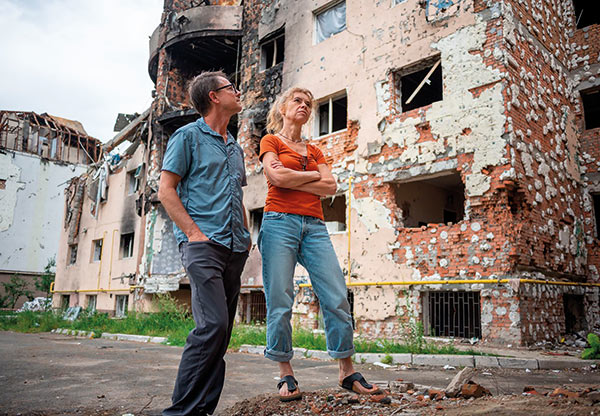Subtotal: $
Checkout-

Places to Think with Neighbors
-

Letters from Readers
-

Covering the Cover: The Enemy
-

Thanksgiving Starts in September
-

The Monsignor versus the Fascists
-

Do Activists Need Enemies?
-

The Making of Martyrs
-

Visions of the Kingdom
-

Foolhardy Wisdom
-

Tough Love on the Mount
-

Walls behind Bars
-

My Mind, My Enemy
-

Demining the Sahara
-

Just Doing What Christians Do
-

Hating Sinners
-

Students Brave the Heat
-

The Witching Hour
-

Enemy Lovers
-

How God Sees Us
-

Macedonia Morning
-

Tim Keller: New York’s Pastor
-

What Is Time For?
-

Poem: “South Head, a Wild Surmise”
-

Poem: “Lammergeier”
-

Poem: “World Within”

When Love Seems Impossible
Working in war zones tests my commitment to nonviolence daily. It’s the survivors who show me the way.
By Oddny Gumaer
October 30, 2023
Available languages: Español
Next Article:
Explore Other Articles:
Doing relief work in Bangladesh, Iraq, and Ukraine, I get this feeling sometimes: a wave of nausea comes over me and I know that if I don’t walk away quickly and focus elsewhere, I will start crying uncontrollably. The pain, sorrow, and desperation of people I have met fill my heart and suddenly there is no more space. I cannot hear one more story of grief, loss, and suffering; I cannot face another mother, father, or child who is a victim of the world’s brutality.
It’s not my pain I feel; it’s theirs. Then it is the feeling of inadequacy, of being powerless to fix their lives or fix the world.

A child in Dahuk, Kurdistan, at a temporary camp for Yazidi refugees. All photographs courtesy of Oddny Gumaer.
They told me she was going crazy because some days ago, her house had collapsed when a bomb hit it, and her four sons were buried underneath. They were still there. Dead now. She wanted somebody to help her uncover them to give them a proper burial.
“We don’t have the time to rescue the dead,” they told her. “Our time must be spent saving the living.”
She screamed again. I thought about how I would have acted had it been my three daughters buried under the ruins of my home. I would have acted crazy, just like her. So I put my arms around her. The only thing I knew how to do. She pushed me away and walked on, still screaming.
Faced with such horrors, there are times when I want the perpetrators to die, painfully. I get an intense urge to make these people suffer for their crimes. It seems we are hardwired for such a response: we want revenge when injustice has been committed.

Oddny and her husband, Steve, next to apartment buildings bombed by the Russian army in Irpin, near Kyiv.
But my desire for revenge quickly fades. “The old law of an eye for an eye leaves everyone blind,” quoted Martin Luther King Jr. Of course, this is what Jesus said too, telling us not to resist an evil person but to turn the other cheek. Violence begets violence; responding to evil with evil perpetuates an endless cycle of vengeance.
I understand this. I understand it well when I am sitting at home in my living room, where there is no war and nobody is attacking my country or my family. The principles of nonviolence have been part of my identity for years as I marched for peace, lobbied in the halls of power, and fought for democracy by wearing T-shirts with political slogans or signing petitions.
As I encounter a village reduced to rubble, however, the devastation rattles my convictions. Bullet-riddled walls serve as reminders of the brutality endured; a lone teddy bear abandoned in the dirt serves as a symbol of lost childhood. I hear stories of tanks crushing cars for amusement and of soldiers raping girls. In the face of such atrocities, my commitment to nonviolence is tested.
At such times, it has been the victims who have pointed me in the right direction. Once, at a hidden site in the jungles of Myanmar where a group of Rohingya people lived in constant fear of being discovered after their village was burned to the ground by government soldiers, I asked, “Do you hate them?”
Their response was one of bewilderment as they explained, “We cannot hate them, for by doing so, we would become like them.” For them, the path to survival was forgiveness.

A child in Kherson, under Russian occupation. This same area was later affected by the collapse of the Kakhovka Dam, which flooded many villages.
I asked a Bengali guard why Bangladesh, despite its own economic challenges, chose to accept a substantial number of Rohingya refugees escaping the Myanmar government’s genocide. I will never forget his response: “We have endured much suffering ourselves. We understand firsthand the anguish they face. It is natural for us to provide refuge to those who are also struggling with terrible suffering.”
Despite ongoing persecution, the Karen people of Myanmar regularly hold thanksgiving services. I asked one of them why they were thankful, if their lives were so miserable. She responded: “There is much to be thankful to God for. We are alive. We had food to eat today. The rains ceased.”
During visits to villages in the Donetsk region of Ukraine, I hear similar sentiments. Here unrest has persisted since 2014 and the sound of explosions fills the air throughout the day. “I have cried for days,” a young mother of two says. “I am crying because brothers are killing brothers. I do not hate the Russians, and now we are forced to fight them.”
A twenty-six-year-old Ukrainian soldier expresses his reluctance to shoot Russians. “I wish they would just go home to their wives and children,” he said. “I don’t like killing people. The first time I shot a man, it struck me that he, too, was a man just like me.”
Already a subscriber? Sign in
Try 3 months of unlimited access. Start your FREE TRIAL today. Cancel anytime.




































Kathy Sink
Correct attribution: An eye for an eye makes the whole world blind- Mohandas Karamchand Gandhi, India (1869- 1948)
Terry Fife
God bless Odney and her husband.